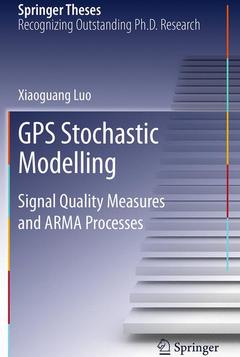Description
GPS Stochastic Modelling, 2014
Signal Quality Measures and ARMA Processes
Springer Theses Series
Language: English
Subjects for GPS Stochastic Modelling:
GPS Stochastic Modelling
Publication date: 09-2016
Support: Print on demand
Publication date: 09-2016
Support: Print on demand
GPS Stochastic Modelling
Publication date: 07-2013
331 p. · 15.5x23.5 cm · Hardback
Publication date: 07-2013
331 p. · 15.5x23.5 cm · Hardback
Description
/li>Contents
/li>Biography
/li>Comment
/li>
Global Navigation Satellite Systems (GNSS), such as GPS, have become an efficient, reliable and standard tool for a wide range of applications. However, when processing GNSS data, the stochastic model characterising the precision of observations and the correlations between them is usually simplified and incomplete, leading to overly optimistic accuracy estimates.
This work extends the stochastic model using signal-to-noise ratio (SNR) measurements and time series analysis of observation residuals. The proposed SNR-based observation weighting model significantly improves the results of GPS data analysis, while the temporal correlation of GPS observation noise can be efficiently described by means of autoregressive moving average (ARMA) processes. Furthermore, this work includes an up-to-date overview of the GNSS error effects and a comprehensive description of various mathematical methods.
This work extends the stochastic model using signal-to-noise ratio (SNR) measurements and time series analysis of observation residuals. The proposed SNR-based observation weighting model significantly improves the results of GPS data analysis, while the temporal correlation of GPS observation noise can be efficiently described by means of autoregressive moving average (ARMA) processes. Furthermore, this work includes an up-to-date overview of the GNSS error effects and a comprehensive description of various mathematical methods.
Introduction.- Mathematical Background.- Mathematical Models for GPS Positioning.- Data and GPS Processing Strategies.- Observation Weighting Using Signal Quality Measures.- Results of SNR-based Observation Weighting.- Residual-based Temporal Correlation Modelling.- Results of Residual-based Temporal Correlation Modelling.- Conclusions and Recommendations.- Quantiles of Test Statistics.- Derivations of Equations.- Additional Graphs.- Additional Tables.
Xiaoguang Luo is currently a research associate at the Geodetic Institute of Karlsruhe Institute of Technology (KIT), Germany. He received his Ph.D. in Geodesy and Geoinformatics from KIT in 2012. He is interested in analysing the stochastic model, atmospheric and site-specific effects of GNSS observations, with a special focus on statistical testing and time series modelling.
Outstanding doctoral thesis nominated for a Springer Theses Prize by Karlsruhe Institute of Technology, Germany This work is a key step towards a realistic GNSS stochastic model, and provides good examples of statistical verification and physical interpretation of results This thesis gives an up-to-date overview of the GNSS error effects and a comprehensive description of the mathematical models Various statistical tests and methods of time series analysis are included, which can be applied in other research fields
© 2024 LAVOISIER S.A.S.




